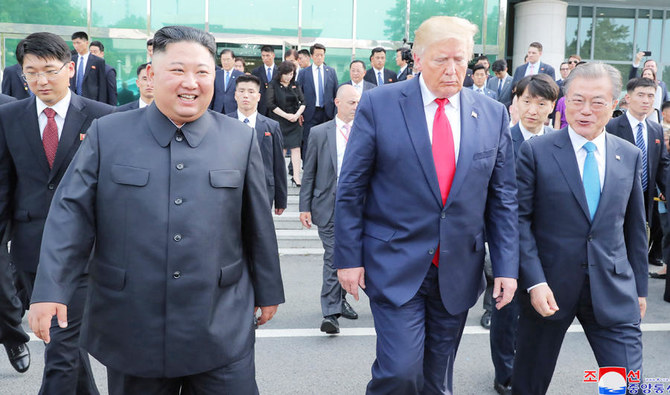SEOUL: In a symbolic gesture of trust-building with a long-time adversary, US President Donald Trump stepped across the military demarcation line dividing the two Koreas on Sunday to meet his North Korean counterpart Kim Jong Un.
Trump became the first sitting US head of state to set foot on North Korean soil, 66 years after the 1950-53 Korean War ended in a truce, not a peace treaty, leaving both Koreas technically at war.
Trump walked toward the line within the Joint Security Area of the Demilitarized Zone (DMZ) at 3:46 p.m. local time and was greeted by Kim, their third encounter after two summits in Singapore and Vietnam.
“Good to see you again,” Kim said as they stood face-to-face on the line, the last vestige of the Cold War.
Trump asked: “Would you like me to come across the line?”
Kim replied, “Honored,” reminding Trump that he would be the first US president to cross over the border, with the US commander-in-chief patting his counterpart on the shoulder, stepping over a small concert curb that suggested the border line drawn at the end of the Korean War.
The young North Korean ruler escorted Trump 20 steps into North Korea and shook hands for photographs. The two turned back together to the boundary, where South Korean President Moon Jae-in joined them.
“I believe this is an expression of his willingness to eliminate all the unfortunate past and open a new future,” Kim said after crossing the line into the South, responding to a reporter’s question about his feeling on the historical meeting on the borderline.
Trump and Kim then had a private meeting at a building in the southern part of the border village for nearly an hour. That was a far more substantial session than Trump expected, as he had previously said he would have time to shake hands with Kim for about four minutes.
In remarks to the press before closing the doors, Kim said that he was “very surprised” by Trump’s invitation on Twitter.
“We should shake off history and move forward to the future,” Kim said. “I didn’t expect to meet you at this place.”
After the bilateral dialogue, Trump revealed that he had agreed with Kim to restart working-level denuclearization talks within three weeks. The denuclearization negotiations have been stalled since the collapse of the Hanoi summit in February between the leaders of the US and North Korea over disagreements about the relief of sanctions against the communist regime.
“We just had a very, very good meeting with Chairman Kim,” Trump told reporters after parting with Kim at the border. “We’ve agreed that we’re going to designate a team. The teams will try to work out some details.”
Trump indicated, however, that he would not lift sanctions on North Korea in a hasty manner.
“Speed is not the object,” he said. “Nobody knows how things turn out.”
Trump said that he had invited Kim to the White House, and the North Korean leader said that he would come to the US when the timing was right.
On his way back to the North, Kim said: “The fact that we will be able to meet each other anytime now, I think this is the signal this meeting will send.”
Claiming to be a peace mediator between Washington and Pyongyang, President Moon hailed the Trump-Kim summit at the DMZ.
“I believe we have just overcome a hill in that overall (denuclearization) process,” he said, standing side by side with Trump. “So, the 80 million Korean people on the Korean Peninsula have been given hope thanks to today’s meeting.”
The prelude to the DMZ get-together was a bout of friendly letters, exchanged between Trump and Kim in recent weeks, which Trump called “beautiful” and Kim described as “excellent.”
In a joint press conference earlier in the day with Moon, Trump revealed that the surprise meeting plan was long prepared for and delivered via the letters. He said that he made his final decision to meet Kim at the DMZ during the G20 summit in Japan last week.
North Korea experts believe that the DMZ encounter will jumpstart the stalled denuclearization talks.
“The meeting was a perfect scenario with producer Trump, main actor Kim, and cameo Moon,” said Kim Dong-yup, an analyst at the Institute for Far East Studies at Kyungnam University in Seoul. “They have just achieved mission impossible. The results of the DMZ meeting are expected to have a positive impact on the denuclearization process.”
However, there is a mountain to climb on working-level negotiations between the US and North Korea.
“Their decision to restart working-level talks seem to be sincere, but narrowing gaps over their respective arguments on nuclear disarmament steps would still take time,” the analyst said.
Shin Beom-cheol, an analyst at the Asan Institute for Policy Studies, said that the high-profile meeting would at least help to reduce tensions on the peninsula following the Hanoi fiasco.
“This meeting could prevent any conflict situation from being unfolded amid a tug-of-war on denuclearization. It’s just meaningful for both sides to agree to return to the negotiating table.”
Some critics say Trump has provided the North Korean leader with photo opportunities without tangible progress toward denuclearization. Trump has dismissed such claims, contending his diplomatic efforts have resulted in substantial progress as the North has stopped conducing nuclear tests and firing long-range missiles.
“The DMZ meeting is symbolic but the thing is substantial progress,” said Moon Sung-mook, head of the Unification Strategy Center at the Korea Research Institute for National Strategy. “The North keeps demanding the United States should change its attitude toward the denuclearization process, so it’s unclear if the working-level negotiations would produce results.
















